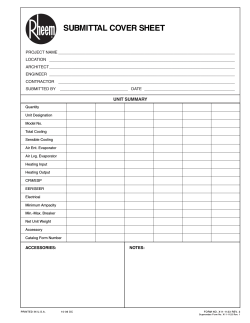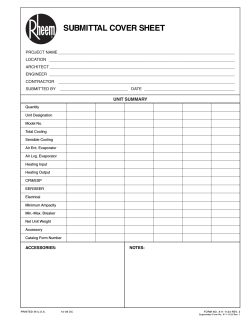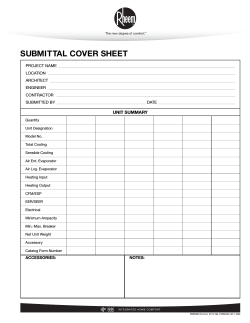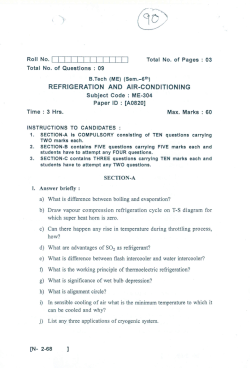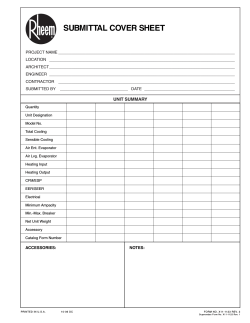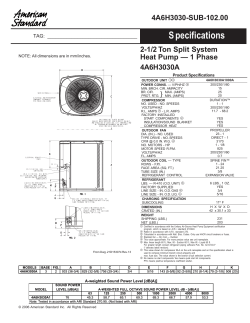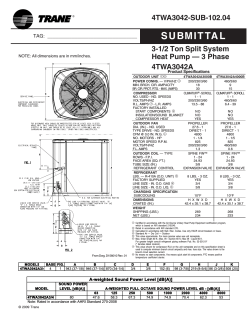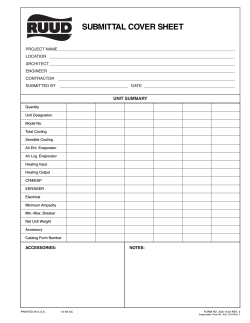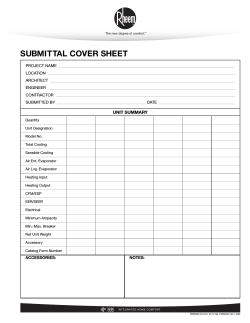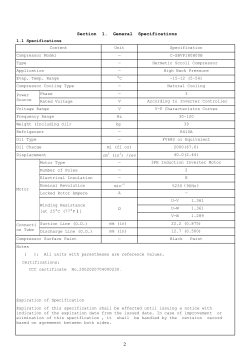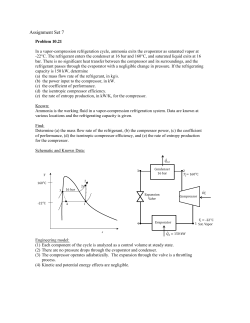
ME354 − C Name:
ME354 Thermodynamics 2 Name: Quiz #3 - T02: ID #: Problem: A commercial refrigerator with refrigerant- 134a as the working fluid is used to keep the refrigerated space at −30 ◦ C by rejecting its waste heat to cooling water that enters the condenser at 18 ◦ C at a rate of 0.25 kg/s and leaves at 26 ◦ C. The refrigerant enters the condenser at 1.2 M P a and 65 ◦ C and leaves at 42 ◦ C. The inlet state of the compressor is 60 kP a and −34 ◦ C and the compressor is estimated to gain a net heat of 450 W from the surroundings. Determine: (a) (b) (c) the quality of the refrigerant at the evaporator inlet, the refrigeration load, [kW ] the COP of the refrigerator, Assumptions 1. SS − SF 2. KE = P E → 0 3. properties are constant Part a) state T (◦ C) P (kP a) h (kJ/kg) 1 2 3 4 -34 65 42 60 1200 1200 60 230.05 295.13 111.37 111.37 s (kJ/kg · K) comment Table A-13 1 mark h4 = h3 State 1 We first notice from Table A-12, our temperature at 1 is above the saturation temperature at 60 kP a, therefore state point 1 is in the superheated region. From Table A-13 at P1 = 0.06 M P a we need to interpolate. h1 = 0.826(227.79) + 0.174(240.76) = 230.05 kJ/kg 1 mark State 3 We notice from Table A-12, our temperature at 3 is below the saturation temperature 1200 kP a, therefore state point 3 is in the sub cooled region. From Table A-11 we can determine h3 = hf (T ) + vf (T )[P − Psat (T )] = 111.26 + 0.0008786(1200 − 1072.8) = 111.37 kJ/kg 1 mark State 4 State point 4 is under the dome with pressure and entropy known, therefore from Table A-12 x4 = 111.37 − 3.841 227.79 − 3.841 = 0.4802 ⇐ 1 mark Part b) The mass flow rate of the refrigerant can be determined by applying a 1st law energy balance across the condenser. The water properties can be obtained by using a saturated liquid at the given temperature hw1 = hf @18 ◦ C = 75.54 kJ/kg 1 mark hw2 = hf @26 ◦ C = 109.01 kJ/kg ˙ w (hw2 − hw1 ) m ˙ R (h2 − h3 ) = m m ˙ R (295.13 − 111.37) kJ/kg = (0.25 kg/s)(109.01 − 75.54) kJ/kg m ˙ R = 0.0455 kg/s 2 marks The refrigeration load is given as ˙ R (h1 − h4 ) = (0.0455 kg/s)(230.03 − 111.37) kJ/kg = 5.39 kW ⇐ Q˙ L = m 1 mark ˙ in. This includes the Qin of the compressor Note: Cengel calculates the refrigeration load as Q˙ H − W in addition to the enthalpy of the evaporator and provides a Q˙ L = 5.85 kW . While not technically the cooling load, I will accept this answer. Part c) The specific work into the compressor can be determined as win = (h2 − h1 ) − Q˙ in m ˙R = (295.13 − 230.03) kJ/kg − 0.450 kJ/s 0.0455 kg/s = 55.21 kJ/kg 1 mark The COP is determined as COP = q˙L w˙ in = h1 − h4 win = (230.03 − 111.37) kJ/kg 55.21 kJ/kg = 2.14 ⇐ 1 mark Note: I have calculated qL as the actual heat gain across the evaporator. Cengel calculates qL = qH − win. Since win is biased by the heat gain at the compressor this leads to a COP = 2.33. I will accept this as a valid solution although, the COP should only be based on the actual energy gain which is h1 − h4 .
© Copyright 2025

